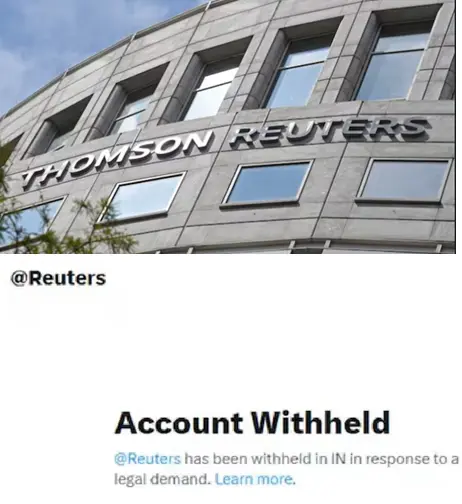
India blocks Reuters’ official X handle citing a “legal demand,” but the government denies issuing any new order.
The Block Heard Around the World: What Happened to Reuters’ X Handle?
On July 6, 2025, users in India attempting to access the @Reuters and @ReutersWorld handles on X were met with a stark message:
“Account withheld in India in response to a legal demand.”
The abrupt restriction of one of the world’s most respected news agencies sent shockwaves through media and diplomatic circles. While Reuters’ website and affiliated handles, such as Reuters Tech News, Reuters Asia, and Reuters Fact Check, remained accessible, the main accounts were suddenly invisible to Indian users.
The platform, owned by Elon Musk, cited a “legal demand” as the reason. However, the Indian government quickly distanced itself, stating that no new takedown order had been issued. Officials from the Ministry of Electronics and Information Technology (MeitY) clarified that they were working with X to resolve the issue, calling it a “mistake” by the platform.
So what triggered the block? According to sources, the action may stem from an earlier legal request made during Operation Sindoor, a high-stakes military operation in May 2025, during which the government had issued over 8,000 takedown orders to curb misinformation. While Reuters was reportedly included in that list, its account was never blocked at the time. X appears to have acted belatedly, enforcing the old request without reassessing its current relevance.
Legal Labyrinth: Operation Sindoor, Platform Policy, and Government Denial
The Reuters block has exposed a murky intersection of legal compliance, platform policy, and state accountability. Under India’s Information Technology (Intermediary Guidelines and Digital Media Ethics Code) Rules, 2021, platforms like X are required to comply with valid legal demands, including court orders or directives from designated government agencies.
However, in this case, the government denies issuing any fresh directive, and insists that the May 2025 request is no longer applicable. Officials have reportedly sent a formal notice to X, demanding an explanation and immediate restoration of the account.
This isn’t the first time India has clashed with global tech platforms over content regulation. In recent years, the government has ordered takedowns of content from BBC, Al Jazeera, and Pakistani media outlets, citing national security and misinformation concerns. But the Reuters block stands out due to the agency’s global stature and the lack of transparency surrounding the decision.
Meanwhile, X’s own policy states that it may withhold content or accounts in specific countries if compelled by a valid legal demand. But critics argue that the platform’s lack of timely communication and inconsistent enforcement has only deepened confusion.
Global Repercussions: Free Speech, Platform Power, and the Road Ahead
The incident has reignited debates over press freedom, digital sovereignty, and the unchecked power of tech platforms. Media watchdogs and civil liberties groups have called for greater transparency in how takedown requests are handled, both by governments and platforms.
Key Concerns Raised:
- Due Process: Was Reuters given prior notice or a chance to appeal the block?
- Transparency: Why did X act on an outdated request without verifying its validity?
- Precedent: Could this embolden future misuse of takedown mechanisms?
The timing is also significant. The Karnataka High Court is currently hearing a case where X is challenging the Indian government’s content blocking powers under Section 79(3)(b) of the IT Act. During a recent hearing, X’s counsel criticized the delegation of takedown authority to “virtually every Tom, Dick, and Harry” in the government, a remark that drew sharp rebuttals.
As of now, Reuters has not issued an official statement, and its main X accounts remain inaccessible in India. The government insists it is working to resolve the issue, but the damage to public trust and platform credibility may already be done.
In an era where information is power, the sudden silencing of a global news agency, even temporarily, raises urgent questions. Whether this was a bureaucratic blunder or a deeper systemic flaw, one thing is clear: the rules of digital engagement need clarity, accountability, and above all, transparency.
Stay updated with the latest news on Rapido Updates. Keep yourself updated with The World, India News, Entertainment, Market, Automobile, Gadgets, Sports, and many more